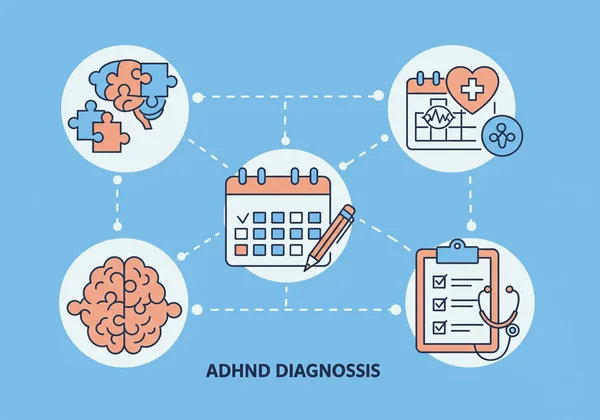Talk to a Doctor About ADHD: Using Your ASRS Test Results
August 26, 2025 | By Miles Harrison
You’ve taken the first step. After completing an Adult ADHD Self-Report Scale (ASRS), you have a report in your hands that might offer a new lens through which to view your life's challenges. It's completely normal to feel a mix of validation, confusion, and even anxiety about what comes next. If you're wondering how to effectively talk to doctor about adhd, you're not alone. This guide is here to help you turn your ASRS test results into a powerful tool for a productive conversation, moving you toward the clarity you deserve.
Many people start this journey by asking, how to test yourself for ADHD? Taking a confidential screener is an excellent, proactive beginning. Now, let's prepare you for the crucial next step: discussing those findings with a healthcare professional. If you haven't taken the test yet, consider getting your personalized AI report through our confidential ASRS test to start your journey.
Preparing for the ADHD Diagnosis Process
Approaching a doctor with a self-screener result can feel daunting, but preparation is your greatest asset. Organizing your thoughts and information beforehand will not only boost your confidence but also help your doctor understand your situation more clearly. This is a crucial part of the adult ADHD diagnosis journey.

Understanding Your ASRS Test Results
First, it’s vital to understand what your ASRS test results mean. The ASRS is a highly respected screening tool developed by the World Health Organization (WHO), but it is a screener, not a diagnostic instrument. It indicates that you have symptoms consistent with ADHD and that a professional evaluation is warranted.
When you review the AI-powered report from the ASRS test online, look beyond the simple score. Pay attention to the patterns of your responses. Which symptoms did you rate as occurring most frequently? Do they fall more under the inattentive category (e.g., trouble organizing tasks, losing things) or the hyperactive/impulsive category (e.g., fidgeting, interrupting others)? Understanding these nuances will help you articulate your struggles more effectively.
Documenting Your Real-Life Examples
A doctor will need more than a score; they need context. Your lived experience is the most compelling evidence you can provide. Before your appointment, take some time to brainstorm and write down specific examples of how these symptoms have impacted different areas of your life.
Think about:
- Work/Academics: Have you missed deadlines, struggled to complete tedious tasks, or made careless mistakes? Do you find it hard to listen during long meetings or lectures?
- Relationships: Do friends, family, or partners complain that you don't listen? Do you forget important dates or obligations? Does impulsivity cause friction?
- Daily Life: Is your home chronically disorganized? Do you struggle with managing finances, paying bills on time, or completing household chores? Do you often feel restless?
Jotting down a few concrete examples for each area will transform abstract symptoms into tangible challenges that a medical professional can better understand and assess.

Gathering Your Personal and Family History
A comprehensive ADHD evaluation involves looking at your life history. ADHD is a neurodevelopmental condition, meaning its symptoms must have been present in some form during childhood. Your doctor will likely ask questions about your past, so preparing this information in advance can streamline the appointment.
Consider the following:
- Childhood Symptoms: Can you recall struggling with focus, organization, or hyperactivity in school? Old report cards can sometimes offer clues, with comments like "doesn't live up to potential" or "is a daydreamer."
- Family Mental Health: Is there any history of ADHD, anxiety, depression, or other mental health conditions in your family? These can sometimes be relevant.
- Other Conditions: List any other physical or mental health diagnoses you have and any medications you are currently taking. Many conditions have overlapping symptoms with ADHD.
What to Expect When You Talk to Your Doctor About ADHD
With your preparation complete, you can walk into your appointment feeling informed and ready. Knowing what to expect during the conversation can further ease any anxiety and help you advocate for yourself effectively.
How to Start the Conversation
Getting the conversation started is often the hardest part. You don't need a complicated opening. A simple, direct approach is best.
Here are a few scripts you can adapt:
- "I've been struggling for a while with focus and organization, and it's affecting my work. I recently took an online ADHD screener called the ASRS, and the results suggested I should speak to a professional. I'd like to discuss them with you."
- "I'm here today to talk about the possibility of adult ADHD. I've noticed many symptoms in myself that seem to align with it, and I used a WHO-endorsed self-report scale that confirmed my concerns."
This approach immediately frames the conversation, states your concern, and presents the ASRS test as the data point that prompted your visit.

Presenting Your ASRS Test Results to the Doctor
When you present your results, frame them correctly. You can bring a printout of your AI-generated report or have it available on your phone. This report is a great starting point for the discussion.
Explain it this way: "I completed this adult adhd selfreport scale, and my results indicate a high likelihood of symptoms consistent with ADHD. I brought my detailed report, which breaks down my responses, to show you the specific areas where I'm struggling."
By referencing the tool's credibility (WHO-endorsed) and presenting it as a starting point for discussion, you position yourself as an informed and proactive patient. This helps build a collaborative relationship with your doctor.
Key Questions to Ask During Your Appointment
Your appointment is a two-way street. It's your opportunity to gather information as well. Having a list of questions ready ensures you don't forget anything important in the moment.
Consider asking:
- What is your experience and process for diagnosing adult ADHD?
- Based on what I've shared, what are your initial thoughts?
- Could any other conditions (like anxiety, depression, or thyroid issues) be causing these symptoms?
- What are the next steps in the evaluation process from here?
- Could you refer me to a specialist, like a psychiatrist or psychologist, if that's the next step?
Navigating the Path to Get Diagnosed with ADHD
The path to a diagnosis isn't always linear. You might encounter challenges or uncertainties along the way. Being prepared for these possibilities is key to successful self-advocacy.
What If My Doctor Seems Dismissive?
Unfortunately, some healthcare professionals may not be as familiar with the nuances of adult ADHD, especially in women. If you feel your concerns are being dismissed, don't be discouraged.
Here are some strategies:
- Stay Calm and Refer to Your Notes: Calmly refer back to the specific, real-life examples you prepared. Say, "I understand your point, but can we talk about how these specific issues are impacting my ability to function?"
- Ask for Their Reasoning: Politely ask, "Could you help me understand why you don't think these symptoms point toward ADHD?" or "What other possibilities should we be exploring?"
- Seek a Second Opinion: You have the right to seek a second opinion, preferably from a specialist in adult ADHD. A primary care doctor is a great starting point, but a psychiatrist or psychologist often has more specialized training in this area.
Understanding a Comprehensive ADHD Evaluation
Your initial conversation is just one part of a comprehensive evaluation. If your doctor agrees that further assessment is needed, the process may include several other components.
A full evaluation for an adult ADHD test might involve:
- In-depth Clinical Interviews: Detailed conversations about your symptoms, personal history, and developmental milestones.
- Additional Questionnaires: You might be given more detailed scales to fill out. Sometimes, a partner or family member may also be asked to provide their perspective.
- Medical Examination: To rule out other physical conditions that could be causing your symptoms.
- Referral to a Specialist: Your doctor may refer you to a psychiatrist or psychologist for formal diagnostic testing and treatment planning.
This thorough process ensures an accurate diagnosis and helps create the most effective treatment plan for you. The initial online adhd screening is the catalyst for this important journey.

Taking the Next Step: From Screening to Support
Taking an ASRS test and deciding to speak with a doctor is a courageous and empowering step toward understanding yourself better. By preparing thoroughly, documenting your experiences, and knowing what to expect, you transform anxiety into action. You are the leading expert on your own life, and your insights are invaluable in the diagnostic process.
Remember, seeking a diagnosis is not about finding a label; it's about gaining access to tools, strategies, and support that can fundamentally improve your quality of life. This conversation is your proactive first step towards better self-management and well-being.
If you are just beginning to explore these questions, your journey starts with a single step. Take our confidential ASRS test today to receive your personalized AI report—the perfect, structured starting point for your conversation with a healthcare professional.
Common Questions About the ADHD Diagnosis Process
How accurate is the ASRS ADHD test for a diagnosis?
The ASRS v1.1 is a highly reliable and valid screening tool for identifying adults who may have ADHD. However, it is not a diagnostic tool on its own. A positive result on the ASRS test indicates that your symptoms are consistent with ADHD and that a full clinical evaluation by a qualified healthcare professional is strongly recommended to determine an official diagnosis.
Is it worth getting an ADHD diagnosis as an adult?
For many adults, receiving a formal ADHD diagnosis is life-changing. It provides an explanation for lifelong struggles, which can reduce feelings of shame or inadequacy. A diagnosis also opens the door to effective treatments, including behavioral therapies, coaching, and medication, which can significantly improve focus, organization, and overall well-being. The decision is personal, but it can be a critical step toward harnessing your full potential.
What feels like ADHD but isn't?
Several other conditions can present symptoms that overlap with ADHD. These include anxiety disorders, depression, thyroid problems, sleep apnea, and even vitamin deficiencies. This is why a comprehensive evaluation from a doctor is essential. They can help differentiate between these conditions and ensure you receive the correct diagnosis and treatment. An ADHD selfassessment is a great way to gather data before seeing a professional who can help rule out other possibilities.